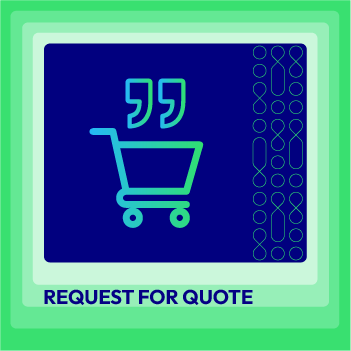Top 8 B2B Ecommerce Websites Customized for Small Companies
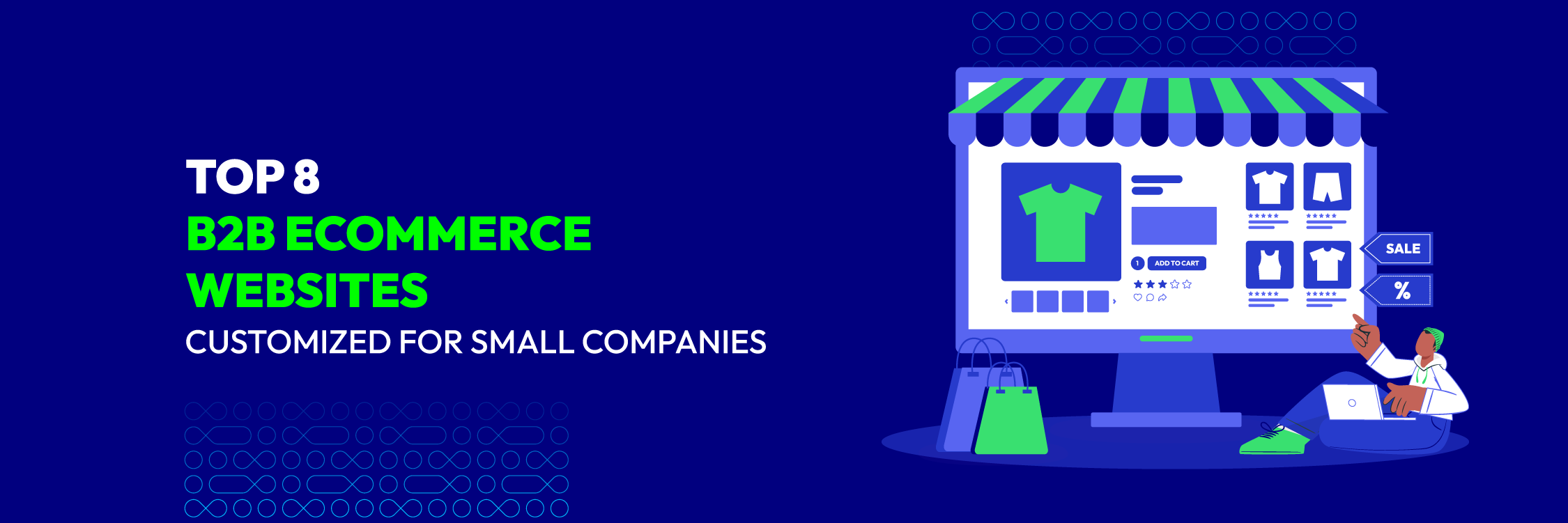
In the fast-paced arena of modern business, establishing a robust online presence is paramount, even for small enterprises. As B2B Ecommerce continues to reshape traditional trade, a new wave of platforms is emerging to cater specifically to small companies. Navigating this sea of options can be daunting, but fear not – our comprehensive guide is here to illuminate the path ahead. Join us as we navigate through a curated selection of top 8 B2B Ecommerce websites that have been fine-tuned to suit the unique requirements of small businesses.
From intuitive interfaces to seamless transaction experiences, these platforms offer a range of features designed to give small companies a competitive edge. Join us as we uncover the power of tailored B2B Ecommerce solutions and discover how these platforms can play a pivotal role in driving the growth and success of small businesses.
What are business-to-business (B2B) ecommerce websites?
Business-to-business (B2B) ecommerce websites are online platforms where businesses engage in buying and selling goods, products, and services exclusively to other businesses.
Unlike business-to-consumer (B2C) ecommerce, which focuses on transactions between businesses and individual consumers, B2B ecommerce centers on facilitating transactions between two or more businesses. These websites provide a digital marketplace where companies can browse, compare, and purchase various products and services to meet their operational needs.
B2B ecommerce platforms often offer specialized features such as bulk ordering, negotiated pricing, customizable catalogs, and streamlined procurement processes to cater to the specific requirements of businesses. These platforms aim to enhance efficiency, convenience, and accessibility for businesses seeking to procure supplies, materials, and services from a diverse range of suppliers within their industry.
B2B ecommerce websites vs. business-to-consumer (B2C) websites
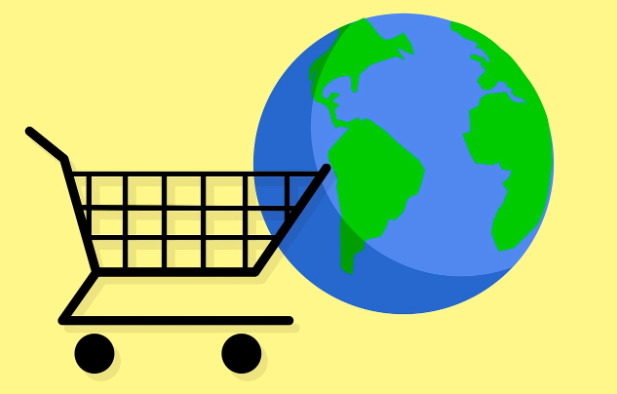
B2C and B2B ecommerce websites share commonalities and distinctions shaped by their audiences and transaction dynamics.
B2C sites cater to individual consumers, while B2B platforms exclusively target businesses for bulk purchases. B2B transactions involve negotiation, multi-step approvals, and a longer buying process. B2B relationships are more enduring and personalized, whereas B2C interactions are transactional.
B2C pricing is fixed, whereas B2B pricing is flexible and tailored to factors like volume. B2B products are often complex and require detailed specifications. Catalogs on B2B sites are customized for business needs, unlike standardized B2C catalogs.
In essence, B2C and B2B ecommerce differ in audience, transaction process, relationships, pricing, product complexity, and catalog structure.
Although B2B and B2C websites target different groups, they do have some similarities. Both B2C and B2B online shops:
- Have easy-to-use designs
- Use SEO and tactics to boost sales
- Show clear product info
- Give rewards and coupons
- Take various payment methods
Because businesses buy things differently and need more from sellers, B2B online shops need extra features. These often include contract pricing, quote management, bulk purchasing options, shopping cart sharing and automatic recording options functions.
Contract pricing
While B2C websites might sometimes change their prices, they usually keep them the same for everyone. In contrast, B2B online shops need more advanced pricing systems. Prices on B2B sites can be different based on contracts and customers. For example, long-time customers might get discounts that new customers can’t access.
Certain B2B ecommerce platforms have built-in contract pricing. This lets you organize customers and offer various price levels to different groups of customers.
Quote management
In B2B buying, requests for quotes (RFQs) are important. Instead of relying on set prices, many businesses ask for personalized quotes that match their specific needs. They might ask multiple suppliers for quotes before choosing one.
B2B ecommerce sites can help your customers request quotes for your products or services. They might offer online tools to generate quotes or submit requests. Some even let you receive and respond to these requests on their platform.
Bulk purchasing options
Businesses often buy things in large quantities. A good B2B website should let customers easily place big orders. They can also include pricing that gets cheaper as you buy more. For instance, if you sell custom-colored socks, buying more pairs might make each pair cost less.
Shopping cart sharing
B2C and B2B ecommerce websites handle two different types of buying processes. B2C buying is simple: a customer sees a product, wants it, and buys it. B2B buying is more complex. Businesses often decide together and may need approval from multiple parties before buying.
Shopping cart sharing and approval workflows on B2B websites make it simpler for businesses to plan, review, approve, and finish purchases.
Automatic reordering options
Businesses frequently need to reorder supplies. For instance, if your business supplies tailor shops with zippers and buttons, those tailors might want to reorder every six months. Allowing clients to reorder automatically through your online store saves time and helps you keep customers by making things easier for them.
Benefits of B2B eCommerce Websites in 2025
The advantages of B2B eCommerce are diverse, contributing to the success of businesses in the digital era.
Enhanced Efficiency
B2B eCommerce platforms offer features like automated order processing, streamlined shipping, and advanced inventory management, leading to time and cost savings. Integration with back-end technologies such as ERP and CRM enhances organizational efficiency.
Elevated Online Visibility
B2B eCommerce websites provide an extensive online presence, spanning search engines and online directories. Enhanced SEO strategies boost visibility, enabling businesses to target specific markets and customers, resulting in a higher return on investment for marketing efforts.
Expanded Customer Reach
User-friendly B2B eCommerce platforms attract a wider customer base, accelerating the customer experience and fostering satisfaction. The internationalization capability allows businesses to reach beyond local markets, expanding their customer portfolio globally.
Improved Brand Recognition
A well-designed B2B eCommerce website acts as a digital storefront, showcasing brand values and offerings. Consistent branding, messaging, and leveraging the online marketplace establish a strong online presence, raising brand awareness, and enhancing reputation.
Increased Revenue
B2B eCommerce platforms enable businesses to reach a broader consumer base, facilitating easy order placement and decision-making. The accessibility and usability of the website encourage frequent and larger purchases, with upselling and Cross-selling contributing to increased average order value and overall sales growth.
Analytics Empowerment
B2B eCommerce platforms offer robust analytics tools, providing insights into customer behavior, sales trends, and popular products. These analytics support data-driven decisions in areas like inventory management, marketing strategies, and product development.
Customer-Centric Experience
Designed with the customer journey in mind, B2B eCommerce platforms offer user-friendly navigation, comprehensive product information, and straightforward ordering procedures. This customer-centric approach fosters loyalty, building trust and encouraging repeat business.
Exceptional Customer Support
B2B eCommerce platforms allow integration with self-service options, empowering customers to access information independently. Efficient communication between customers and sales representatives, along with round-the-clock support and helpful resources, enhances the overall customer service experience.
Multi-Site Management Capability
B2B eCommerce platforms support multi-site management, allowing businesses to oversee multiple sites from a single platform. Customization for different customer segments improves relevance and engagement, making it essential for businesses with multiple locations or subsidiaries.
Tips for a B2B Ecommerce Website to Succeed
The B2B ecommerce sector has witnessed substantial growth in the last decade. However, as customer expectations evolve and align more with B2C practices, traditional B2B approaches are transforming to meet these changing demands.
To stay competitive, it is increasingly crucial for B2B organizations to modernize, placing a strong emphasis on enhancing the customer experience. Achieving this goal involves implementing various strategies, including the following:
Clearly communicate your B2B focus
If your background is predominantly B2C or wholesale, it’s essential to inform potential customers about your shift towards B2B. This can be achieved through elements like quote buttons, credit application links, and dedicated distributor/wholesale signup pages to align with their accustomed language.
Prioritize well-designed UI/UX
A user-friendly, aesthetically pleasing website significantly contributes to an enhanced user experience. Utilize streamlined UI/UX features to make your site easy to navigate, encouraging customers to explore, proceed to checkout, and ultimately, the shopping cart.
Implement responsive web design
Given the increasing importance of mobile accessibility in the modern B2B business model, ensuring your website is responsive across all platforms, including Android and Apple iOS, is imperative. This adaptation caters to customers who frequently access your site via mobile devices, potentially leading to increased sales.
Focus on security
Maintaining a secure website is crucial for long-term business prospects and customer confidence, especially considering the prevalence of data breaches. Adhering to the latest PCI DSS requirements and securing your site with an SSL certificate ensures the safe processing of B2B payment options.
Emphasize speed
Page speed directly impacts customer satisfaction, with slow websites deterring approximately 70% of consumers. Optimize page load times by leveraging content delivery networks (CDNs) like Cloudflare to efficiently deliver static web content and enhance site speed.
Enhance site search and filtering
A robust on-site search and real-time filtering system improves the browsing experience. Faceted filtering and navigation features enable customers to find specific products with ease, eliminating unnecessary distractions.
Leverage SEO features
Effective search engine optimization (SEO) is pivotal for the growth of a modern B2B website. Utilize advanced marketing tools to boost brand awareness, increase conversion rates, and elevate your rankings on search engine results pages.
Prioritize customization
Customization is key to differentiating your website from competitors. Ensure your platform allows for extensive customization, offering flexibility as market trends evolve. This is particularly important for setting up features like bulk ordering or self-service checkouts.
Incorporate reviews and recommendations
Highlighting customer feedback through reviews and recommendations enhances your business’s credibility. Following the example of major ecommerce platforms, such as Amazon and Alibaba, showcasing positive customer experiences on your site and social media can attract potential customers.
Provide multi-language options for international sales
To facilitate international growth, offer your B2B site in multiple languages and currencies. Be aware of regional regulations, such as GDPR in Europe, as compliance is crucial for adapting sales strategies and marketing techniques when expanding into new markets.
Best Practices for B2B Ecommerce Websites
-
Enable Virtual Configuration and Bundling: Provide customers with the ability to virtually configure and bundle complex products independently.
-
Digital Quoting and Requesting: Offer consumers the option to create digital quotes or easily request a quote, facilitating seamless communication with your team.
-
Simplified Order Management: Make it easy for customers to create, manage, and reorder products. Include features for bulk ordering and the ability to save shopping carts or lists.
-
Diverse Payment Options: Provide multiple payment options for B2B buyers, including credit card payments and the option to pay via purchase orders.
-
Clean and Intuitive Website Design: Keep your website clean, simple, and easy to navigate, ensuring a positive user experience.
-
Fast Website Loading: Prioritize web performance for both user experience and search engine optimization. A fast-loading website is crucial for customer satisfaction and search engine rankings.
-
Utilize Varied Content: Leverage various types of website content (blogs, articles, product pages, videos) to address customer-centric questions related to your core personas. This may include differentiation from competitors, goals, product features, pricing, limitations, delivery times, and customer testimonials.
-
Transparent Communication: Clearly communicate your company’s vision and maintain consistent brand messaging. Ensure that customers perceive your business as the best in the industry and the one they want to align themselves with.
-
These practices collectively enhance the overall customer experience, streamline business processes, and contribute to the credibility and perception of your B2B ecommerce website.
8 Popular B2B ecommerce websites
1. Adobe Commerce (formerly Magento)

Operated by the Magento engine, Adobe Commerce seamlessly merges exceptional performance with robust security, catering adeptly to expansive B2B scenarios. It excels in providing omnichannel experiences that span both B2C and B2B realms, all under the umbrella of a single, integrated platform.
Similar to WooCommerce, Adobe Commerce (previously recognized as Magento) operates as an open-source ecommerce solution. Adobe Commerce drives a user base exceeding 270,000 websites and manages transactions totaling more than $100 billion in gross merchandise each year. The platform’s emphasis on B2B transactions encompasses:
- Establishment of company accounts and customer clusters
- Self-service customer portals
- Streamlined purchasing workflows
- Functionality for requesting quotes (RFQ)
- Options for deferred payments
- Advanced analytics capabilities
- Automated reordering facilitated by an extension
For smaller businesses with fiscal constraints, Magento Open Source presents a cost-free and open-source alternative. It further enables the leverage of supplementary Magento extensions and functionalities, enhancing your B2B website. As your enterprise gears up for growth, transitioning seamlessly to Adobe Commerce provides access to advanced features, unleashing boundless potential for your business’s evolution.
2. Shopify Plus

Whether you’re looking to introduce wholesale capabilities to your current online retail store or establish a dedicated B2B website, Shopify offers a unified solution for both. Within the realm of B2B on Shopify, you’ll find all the familiar ecommerce features, enhanced with essential wholesale functionalities necessary for effective online B2B selling.
Shopify Plus, the B2B side of Canadian-based Shopify, is designed for businesses operating in both B2C and B2B spaces. Key features of Shopify Plus include:
- Personalized customer profiles and checkout flows.
- Custom price lists for various buyers or accounts.
- Vast customization and expandability via Shopify’s App Store.
- Adjustable payment terms for each account.
To reduce complications, the B2B aspect of Shopify seamlessly integrates with prominent enterprise resource planning (ERP) providers like Acumatica, Brightpearl, and NetSuite. It’s also designed for integration with customer relationship management (CRM) systems and a vast array of business applications, totaling over a thousand options. This allows you to effortlessly incorporate existing business tools and maintain streamlined operations.
Given Shopify’s existing reputation for offering a secure and dependable platform, its involvement in your business enhances its overall credibility, a crucial factor during the brand-building process.
3. Amazon Business

Amazon requires no formal introduction. Even though Amazon doesn’t precisely match the characteristics of the other platforms mentioned, in line with B2B eCommerce trends, there’s an anticipated rise in B2B sales through online marketplaces like Amazon.
Amazon operates as an internet marketplace and is the dominant ecommerce platform in the United States. Monthly, Amazon’s sites attract more than 197 million active users, generating yearly sales surpassing $300 billion.
Incorporating a B2B facet, known as Amazon Business, this platform extends multi-user accounts, approval pathways, and invoice-based payment solutions. Similar to Alibaba, Amazon serves diverse sectors, delivering virtual shop fronts and product pages.
For Amazon Business’s fundamental package priced at $40 per month (in addition to referral fees ranging from 8% to 45% of item value), the following features are offered:
- Invoice-based payment system
- Approval workflows
- Multi-user accounts
- Segmentation of customers into groups
- Access to a fulfillment network
- Online store capabilities
- Opportunities for wholesale pricing
- Virtual dashboard and comprehensive product data analysis
- Ability to receive and respond to quotes
- Automatic reordering functionality
4. Alibaba

Alibaba stands as a Chinese-based online marketplace and B2B ecommerce website. It holds the title of the world’s largest ecommerce venue for small businesses, catering to various industries by offering both raw materials and finished goods to buyers.
With a global reach spanning 240 countries and a user base exceeding 18 million, Alibaba serves as an excellent option for small to medium-sized enterprises involved in overseas trade and cross-border commerce.
Alibaba’s offerings include a 30-day window of free product listings and provision of both a storefront and product pages for its members. For B2B sellers, a range of plans is available: standard, extended, and premium. Higher-tier plans offer increased spending on keyword advertisements and more comprehensive account management services.
Enhanced features are also available, such as gold and verified supplier badges, which allow for showcasing 10 and 40 products respectively. These badges come with additional perks like research and development support and quality control.
In terms of cost, Alibaba’s standard plan requires a $3,500 annual fee and provides:
- Unlimited product listings
- Online stores
- Analytics dashboard
- Built-in CRM
- Keyword insights
- Quotation acceptance and response capabilities
- Wholesale pricing opportunities
5. WooCommerce
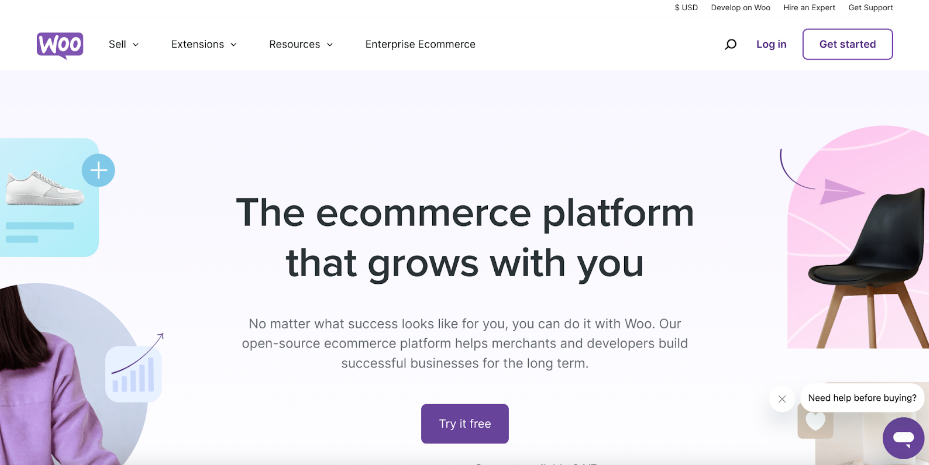
Transform your WordPress website into an ecommerce store optimized for both B2C and B2B clientele. By incorporating the WooCommerce B2B extension, you gain access to advanced functionalities and increased adaptability for effectively managing your wholesale division.
WooCommerce functions as an open-source ecommerce platform and is the preferred commerce plugin for WordPress websites. As of 2022, 29% of the top million ecommerce sites accessed WooCommerce.
With WooCommerce, you can establish online stores, access a mobile application, and accommodate diverse payment methods. Differing from Amazon Business and Alibaba, WooCommerce doesn’t establish distinct storefronts within a larger marketplace. Instead, it seamlessly integrates with WordPress, enabling the creation of separate online stores.
WooCommerce operates on an open-source model, wherein the primary plugin is available at no cost. The B2B extension carries a $70 charge for a lifetime license. With WooCommerce B2B, you gain access to:
- Customer segmentation
- Discounts based on volume
- Wholesale pricing options
- Request for Quote (RFQ) functionality
- Advanced tax management features
- Efficient shipping management
- Integration with WordPress
- Automated reordering capabilities
6. Salesforce B2B Commerce
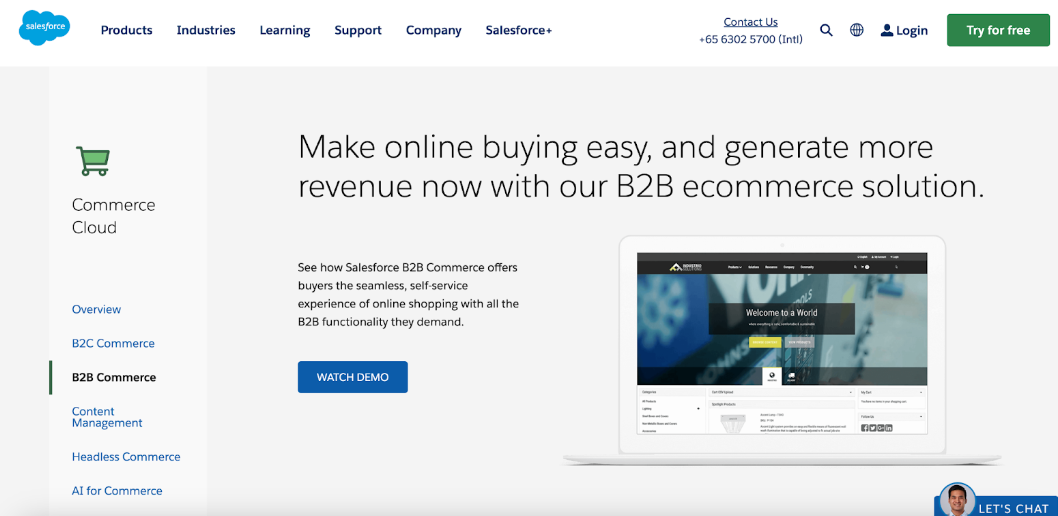
Launch your B2B ecommerce website swiftly and expedite market entry. Salesforce accelerates business growth by enhancing B2B efficiency and cultivating seamless omnichannel interactions for your clientele.
Elevate effectiveness by amalgamating your applications, data, processes, and systems crucial for B2B operations management. Access the Salesforce dashboard for a comprehensive customer overview, fostering better understanding of their requirements. Salesforce enables the provision of B2C shopping experiences to enhance the appeal of B2B transactions. It offers access to practical features like custom catalogs, swift reordering, contract-based pricing, and other tools that simplify the intricacies of B2B shopping.
Harnessing Salesforce, you forge enduring B2B relationships by delivering interconnected customer experiences. Harmonize the buyer journey by engaging clients across each interaction point. Leverage data analytics to offer purchasing suggestions and guide their path. Elevate customer retention rates through consistent connectivity and delivery of pertinent content.
With these capabilities at your disposal, Salesforce B2B commerce empowers tailored alignment of your B2B platform with your business and customer needs.
7. Mercateo
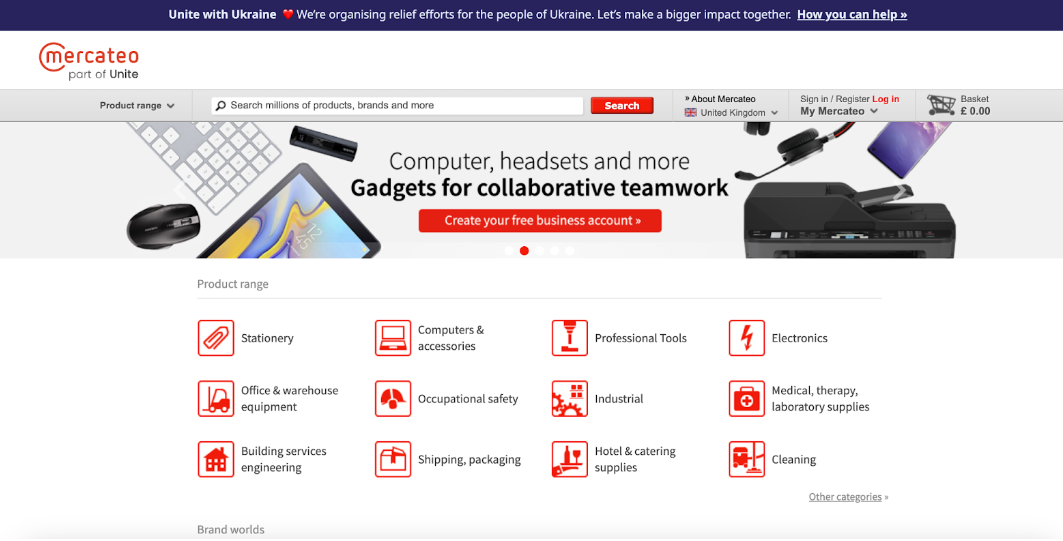
Mercateo serves as an ecommerce procurement platform that offers items from validated suppliers. Based in Munich, Germany, Mercateo isn’t presently accessible to businesses or sellers in the United States.
Differing from platforms like Amazon and Alibaba, where business proprietors must establish B2B stores within their domains, Mercateo directly links supplier catalogs to its centralized interface. This unique approach enables businesses to sell products without the necessity of creating separate online stores.
Key features provided by Mercateo include:
- Supplier memberships without charges
- Absence of seller ranking system
- Tailored contract pricing for businesses
- Single-creditor choices
- Provision of analytics and reporting tools
8. OroCommerce
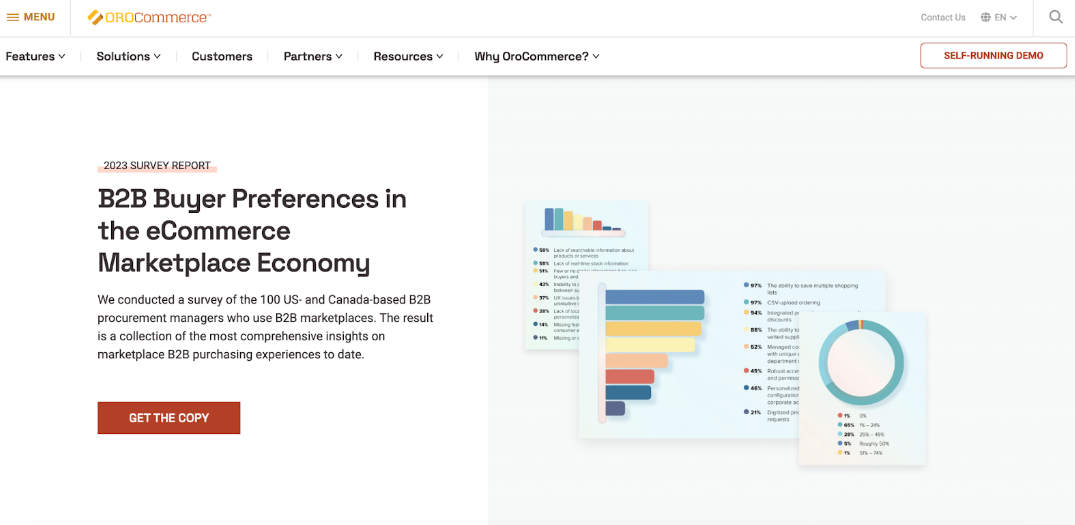
Initiate your digital evolution using the unified B2B ecommerce and CRM platform, OroCommerce. The platform features ready-to-use elements and agile functionalities that facilitate the creation of a sleek and contemporary B2B sales environment. The user-friendly interface empowers you to design and launch your B2B website, all while minimizing development expenses.
OroCommerce serves as an open-source B2B ecommerce solution catering to mid-market and enterprise entities, encompassing distributors, manufacturers, wholesalers, and extensive retailers.
OroCommerce facilitates the incorporation of around 80% of B2B functionalities, with the flexibility to customize the remaining 20% using open-source tools and dynamic APIs, all without incurring additional charges.
Key features of OroCommerce include:
- Promotions management
- Multiple price lists
- Content management system
Conclusion
In a landscape driven by digital transformation, the realm of B2B ecommerce has witnessed a remarkable evolution. Small companies are no longer limited by their scale when it comes to leveraging sophisticated online platforms for their business needs. The top 8 B2B ecommerce websites tailored for small companies offer an array of solutions to enhance efficiency, streamline operations, and expand market reach.
From the dynamic simplicity of Shopify Plus to the intricate capabilities of Magento, these platforms provide diverse avenues to engage B2B customers, foster growth, and thrive in a competitive market. The comprehensive features, customer-centric interfaces, and adaptability showcased by these platforms underscore their commitment to empowering small companies on their journey towards success.
As we navigate the intricate world of B2B ecommerce, the curated list of platforms mentioned in this article serves as a guide, illuminating the possibilities and opportunities that await small companies in their pursuit of online excellence. Embracing these platforms not only propels small businesses into the digital era but also ensures a seamless integration into the B2B ecommerce landscape, enabling them to flourish on a global scale.



